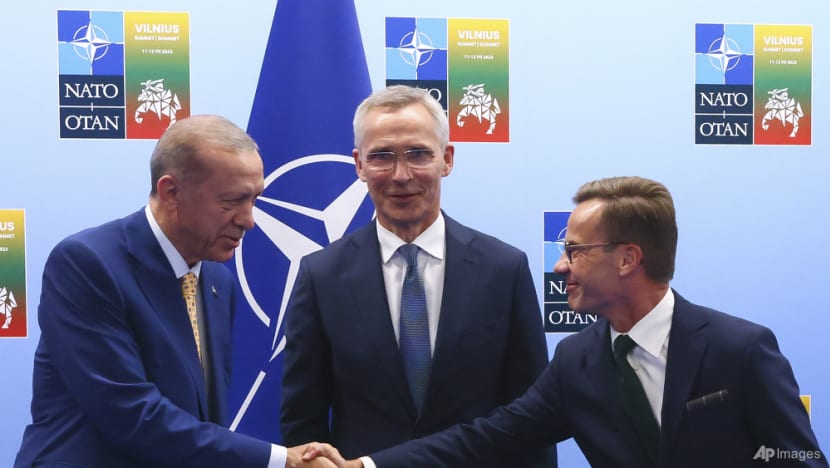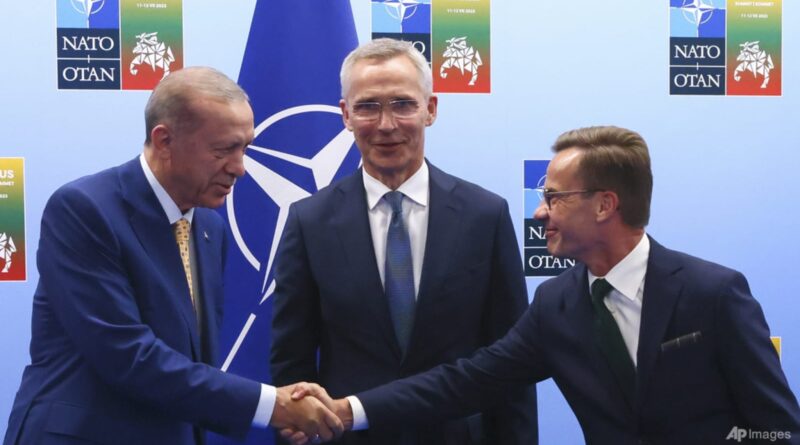What does NATO stand to gain from Sweden becoming a member?
Advertisement
World
At the NATO summit, leaders are also expected to discuss the US’ decision to supply Kyiv with widely banned cluster bombs.

Turkey’s President Recep Tayyip Erdogan, left, shakes hands with Sweden’s Prime Minister Ulf Kristersson, right, as NATO Secretary General Jens Stoltenberg looks on prior to a meeting ahead of a NATO summit in Vilnius, Lithuania, Monday, July 10, 2023. (Yves Herman, Pool Photo via AP)

11 Jul 2023 05:35PM
Sweden joining the North Atlantic Treaty Organization (NATO) is a “fantastic development” and a long time coming, analysts said on Tuesday (Jul 11), a day after Türkiye agreed on the country becoming a member.
Sweden and Türkiye ironed out their differences in last-minute talks in Vilnius, Lithuania, where NATO on Tuesday kicked off its two-day summit focused on supporting Ukraine against Russia’s invasion.
“It really strengthens NATO’s northern flank. It essentially closes off the entire Baltic Sea to Russia,” said Mr Malcolm Davis, senior analyst at the Australian Strategic Policy Institute.
This would be a “huge setback for Russia, which is good news”, he told CNA938’s Asia First.
He added that Sweden is “one of the most advanced military powers on the European continent”.
“It has a sophisticated defence industry. It’s producing everything from naval vessels to fighter aircraft, quite sophisticated platforms and capabilities and weapons,” he said.
Türkiye had been blocking Sweden’s application to join the Atlantic alliance, accusing Stockholm of harbouring Kurdish activists Ankara regards as terrorists.
“Türkiye recognised that it would have been damaged more politically if it stood firm and blocked Sweden’s accession. It would have been seen as basically a spoiling factor in a really important NATO Summit,” he said.
Mr Davis noted that if Russia wins the war in Ukraine, Russia is more likely to confront NATO directly in coming years.
“NATO needs to stand firm and needs to show resolve and unity and having Türkiye undermine that purely out of a sense of agreement over some issues … would have been really counterproductive,” he said.
Ukraine’s military said Russia launched an overnight air strike on Kyiv in the early hours of Tuesday just hours before the start of the NATO summit.
MEMBERSHIP MATTERS
While it is a “very big step” for Turkish President Recep Tayyip Erdogan to agree to push for Sweden’s ratification, Türkiye’s parliament still has to give its approval before the country can become a full member of NATO, noted Dr Heidi Hardt, associate professor of political science at the University of California, Irvine.
Hungary has also yet to agree with Stockholm’s bid, but Prime Minister Viktor Orban has signalled he will follow Mr Erdogan’s lead.
As Sweden looks set to join NATO, Türkiye’s path to membership in the European Union (EU) has also advanced.
On Monday, Mr Erdogan demanded that the European Union (EU) revive his country’s stalled membership bid as a precondition for Sweden joining NATO. Türkiye has been a formal candidate to join the EU since 2005, but talks have long stalled with little sign of progress.
“Sweden will actively support efforts to reinvigorate Türkiye’s EU accession process, including modernisation of the EU-Türkiye Customs Union and visa liberalisation,” said a statement following three-way talks among NATO, Sweden and Türkiye.
Ukraine will also be looking for more information of what might be happening with its path to NATO membership, Dr Hardt, author of “NATO’s Lessons in Crisis”, told CNA’s Asia First.
However, she noted that United States President Joe Biden has said that Ukraine will not be admitted into the alliance while it is at war, which “makes things quite tense in that particular respect”.
“At the same time, the US continues to be the number one contributor in terms of aid to Ukraine,” she said.
Russia has berated the alliance and the US, its leading power, over their support for Ukraine and warned that Kyiv’s membership in NATO would be met with a “clear and firm” reaction.
USE OF CLUSTER MUNITIONS
Dr Hardt said that at the summit, the leaders are expected to discuss the US’ decision to supply Kyiv with widely banned cluster bombs, with the US trying to get its allies to understand the difficult decision it made.
She said that the decision to supply the bombs is controversial as more than 100 countries have signed a convention against the use of these munitions that can harm children and non-combat civilians.
When shot from a missile or dropped, cluster munitions break into dozens or more smaller bomblets, said adjunct associate research scholar Lincoln Mitchell at Columbia University’s Arnold A Saltzman Institute of War and Peace Studies.
Besides being able to kill large numbers quickly, one of the dangers of the bombs is that not all the bomblets detonate immediately, he said.
“They sit there for days, weeks, months, years later, somebody can step on them. Some of them are colourful, so a child might pick one up and it would blow up,” he said.
Russia, Ukraine and the US have not signed on to the Convention on Cluster Munitions, which bans production, stockpiling, use and transfer of the weapons.
The US said that Ukraine, in its written assurances, said it would not use cluster bombs in Russia or in populated areas.
However, the move can backfire on the US, with the possibility of Ukraine using these weapons in Russian territory, noted Dr Mitchell.

